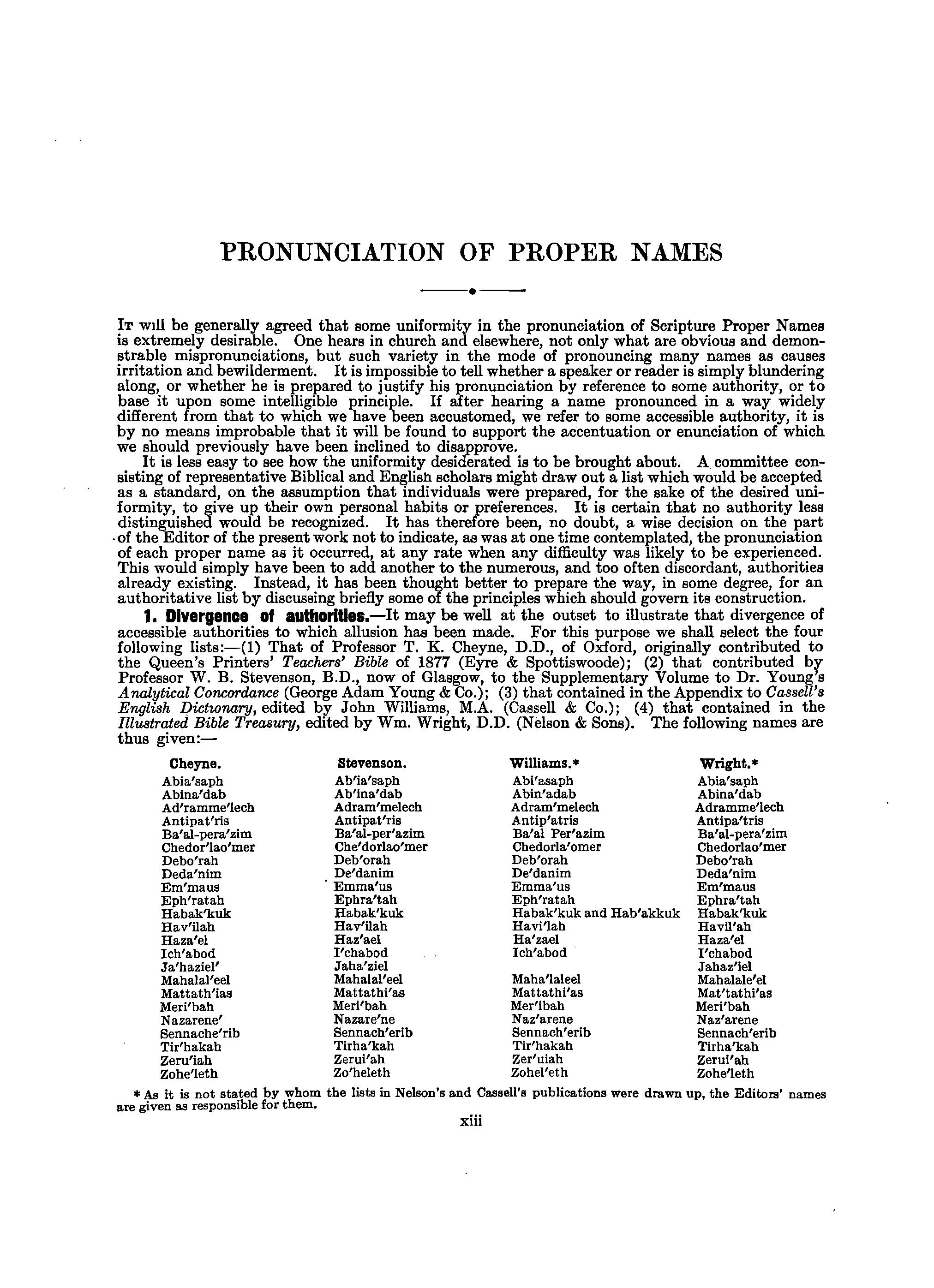PEONUNCIATION
OF
PROPER
NAMES
It
will
be
generally
agreed
that
some
uniformity
in
the
pronunciation
of
Scripture
Proper
Names
is
extremely
desirable.
One
hears
in
church
and
elsewhere,
not
only
what
are
obvious
and
demon-strable
mispronunciations,
but
such
variety
in
the
mode
of
pronouncing
many
names
as
causes
irritation
and
bewilderment.
It
is
impossible
to
tell
whether
a
speaker
or
reader
is
simply
blundering
along,
or
whether
he
is
prepared
to
justify
his
pronunciation
by
reference
to
some
authority,
or
to
base
it
upon
some
intelligible
principle.
If
after
hearing
a
name
pronounced
in
a
way
widely
different
from
that
to
which
we
have
been
accustomed,
we
refer
to
some
accessible
authority,
it
is
by
no
means
improbable
that
it
will
be
found
to
support
the
accentuation
or
enunciation
of
which
we
should
previously
have
been
inclined
to
disapprove.
It
is
less
easy
to
see
how
the
uniformity
desiderated
is
to
be
brought
about.
A
committee
con-sisting
of
representative
Biblical
and
Englisn
scholars
might
draw
out
a
list
which
would
be
accepted
as
a
standard,
on
the
assumption
that
individuals
were
prepared,
for
the
sake
of
the
desired
uni-formity,
to
give
up
their
own
personal
habits
or
preferences.
It
is
certain
that
no
authority
less
distinguished
would
be
recognized.
It
has
therefore
been,
no
doubt,
a
wise
decision
on
the
part
■of
the
Editor
of
the
present
work
not
to
indicate,
as
was
at
one
time
contemplated,
the
pronunciation
of
each
proper
name
as
it
occurred,
at
any
rate
when
any
difficulty
was
likely
to
be
experienced.
This
would
simply
have
been
to
add
another
to
the
numerous,
and
too
often
discordant,
authorities
already
existing.
Instead,
it
has
been
thought
better
to
prepare
the
way,
in
some
degree,
for
an
authoritative
list
by
discussing
briefly
some
of
the
principles
which
should
govern
its
construction.
1.
Divergence
of
authorities.
—
it
may
be
well
at
the
outset
to
illustrate
that
divergence
of
accessible
authorities
to
which
allusion
has
been
made.
For
this
purpose
we
shall
select
the
four
following
lists:
—
(1)
That
of
Professor
T.
K.
Cheyne,
D.D.,
of
Oxford,
originally
contributed
to
the
Queen's
Printers'
Teachers'
Bible
of
1877
(Eyre
&
Spottiswoode);
(2)
that
contributed
by
Professor
W.
B.
Stevenson,
B.D.,
now
of
Glasgow,
to
the
Supplementary
Volume
to
Dr.
Young's
Analytical
Concordance
(George
Adam
Young
&
Co.);
(3)
that
contained
in
the
Appendix
to
Cassell's
English
Dictionary,
edited
by
John
Williams,
M.A.
(Cassell
&
Co.);
(4)
that
contained
in
the
Illustrated
Bible
Treasury,
edited
by
Wm.
Wright,
D.D.
(Nelson
&
Sons).
The
following
names
are
thus
given:
—
*
As
it
is
not
stated
by
whom
the
lists
in
Xelson's
and
Cassell's
publications
were
drawn
up,
the
Editora'
names
are
given
as
responsible
for
them.

